

MacGyverisms. The Seven Habits of Highly Effective People. Changing must abide the LAWS of the Farm: NGO. Polycentrism. Polycentrism is the principle of organization of a region around several political, social or financial centres.
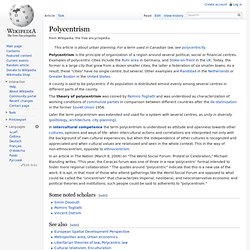
Examples of polycentric cities include the Ruhr area in Germany, and Stoke-on-Trent in the UK. Today, the former is a large city that grew from a dozen smaller cities, the latter a federation of six smaller towns. As a result, these "cities" have no single centre, but several. Other examples are Randstad in the Netherlands or Greater Boston in the United States. A county is said to be polycentric if its population is distributed almost evenly among several centres in different parts of the county. Later the term polycentrism was extended and used for a system with several centres, as unity in diversity (politology, architecture, city planning).
Palantir. Bill of Rights. During the debates on the adoption of the Constitution, its opponents repeatedly charged that the Constitution as drafted would open the way to tyranny by the central government.

Sharing/Open source. DIY. Digital Skills. Principle-Centered Learning Environment. Identity. Ethics. The three major areas of study within ethics are:[1] Meta-ethics, concerning the theoretical meaning and reference of moral propositions, and how their truth values (if any) can be determinedNormative ethics, concerning the practical means of determining a moral course of actionApplied ethics, concerning what a person is obligated (or permitted) to do in a specific situation or a particular domain of action[1] Defining ethics[edit] The word "ethics" in English refers to several things.[6] It can refer to philosophical ethics—a project that attempts to use reason in order to answer various kinds of ethical questions.
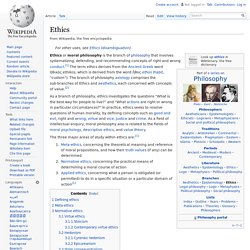
[citation needed] It can also be used to describe a particular person's own, idiosyncratic principles or habits.[7] For example: "Joe has good ethics. " [edit] Main article: Meta-ethics Meta-ethics has always accompanied philosophical ethics. Portal:Contents/Philosophy and thinking. Secular morality. Secular morality is the aspect of philosophy that deals with morality outside of religious traditions. Modern examples include humanism, freethinking, and most versions of consequentialism. Additional philosophies with ancient roots include those such as skepticism and virtue ethics.
Greg M. Morality. Allegory with a portrait of a Venetian senator (Allegory of the morality of earthly things), attributed to Tintoretto, 1585 Morality (from the Latin moralitas "manner, character, proper behavior") is the differentiation of intentions, decisions, and actions between those that are "good" (or right) and those that are "bad" (or wrong).
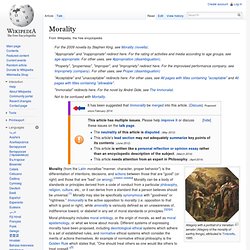
[citation needed] Morality can be a body of standards or principles derived from a code of conduct from a particular philosophy, religion, culture, etc., or it can derive from a standard that a person believes should be universal.[1] Morality may also be specifically synonymous with "goodness" or "rightness. " Portal:Contents/Religion and belief systems. Trust (social sciences) In a social context, trust has several connotations.[1] Definitions of trust[2][3] typically refer to a situation characterised by the following aspects: One party (trustor) is willing to rely on the actions of another party (trustee); the situation is directed to the future.
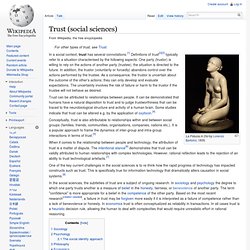
In addition, the trustor (voluntarily or forcedly) abandons control over the actions performed by the trustee. As a consequence, the trustor is uncertain about the outcome of the other's actions; they can only develop and evaluate expectations. The uncertainty involves the risk of failure or harm to the trustor if the trustee will not behave as desired. Trust can be attributed to relationships between people. Prisoner's dilemma. The prisoners' dilemma is a canonical example of a game analyzed in game theory that shows why two individuals might not cooperate, even if it appears that it is in their best interests to do so.
It was originally framed by Merrill Flood and Melvin Dresher working at RAND in 1950. Albert W. Tucker formalized the game with prison sentence rewards and gave it the name "prisoner's dilemma" (Poundstone, 1992), presenting it as follows: Tit for tat. In Western business cultures, a handshake when meeting someone is an example of initial cooperation.

Tit for tat is an English saying meaning "equivalent retaliation". It is also a highly effective strategy in game theory for the iterated prisoner's dilemma. The strategy was first introduced by Anatol Rapoport in Robert Axelrod's two tournaments,[1] held around 1980. Notably, it was (on both occasions) both the simplest strategy and the most successful.[2] An agent using this strategy will first cooperate, then subsequently replicate an opponent's previous action. Online Reputation Management : Reputation.com. About LifeLock. 6 Ways to Manage Your Online Reputation. Understand TrustCloud. Connect.Me. Legit.
Probability. Dialectic. Compassion. Compassion personified: a statue at the Epcot center in Florida Compassion is the response to the suffering of others that motivates a desire to help.[1][2] Compassion is often, though not inevitably, the key component in what manifests in the social context as altruism.
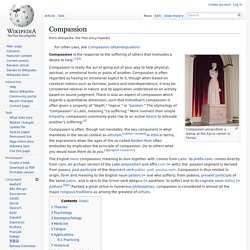
Human rights. Profile on TED.com. Free the Slaves. Social Media for Social Good. Organization: Big Cat RescueOrganization Size: 125 exotic cats, 9 paid staff, 107 volunteers, 80,000 supportersName: Carol BaskinTitle: CEO Website: BigCatRescue.orgBlog: BigCatRescue.org/BlogFacebook: facebook.com/BigCatRescueTwitter: twitter.com/BigCatRescueYouTube: youtube.com/BigCatRescuePosterous: BigCatRescue.posterous.com 1.

What was the very first social media tool your organization utilized, and when? Care2.com Aug 14, 2000: my.care2.com/savethecats 2. What social media tools are you currently utilizing? We have 325 social media sites that we post to regularly, but in addition to all of the ones that everyone knows about, two of the most effective are Posterous and TrafficGeyser because we can post once to these accounts and they syndicate out to hundreds of article, podcast, blog, video and photo sites at once. 3. We have two full-time, paid people working on social networking along with me. 4.
Join the fight against extreme poverty. The Universal Declaration of Human Rights. Rights of Nature. List of types of equilibrium. This is a list of various types of equilibrium, the condition of a system in which all competing influences are balanced.
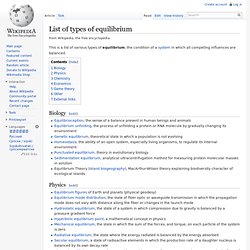
Biology[edit] Equilibrioception, the sense of a balance present in human beings and animalsEquilibrium unfolding, the process of unfolding a protein or RNA molecule by gradually changing its environmentGenetic equilibrium, theoretical state in which a population is not evolvingHomeostasis, the ability of an open system, especially living organisms, to regulate its internal environmentPunctuated equilibrium, theory in evolutionary biologySedimentation equilibrium, analytical ultracentrifugation method for measuring protein molecular masses in solutionEquilibrium Theory (Island biogeography), MacArthur-Wilson theory explaining biodiversity character of ecological islands Physics[edit] Chemistry[edit] Privacy International.
Murphy's law. Murphy's law is an adage or epigram that is typically stated as: Anything that can go wrong will go wrong.
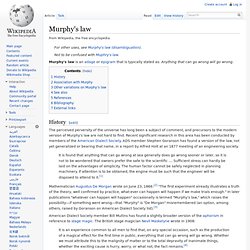
History[edit] The perceived perversity of the universe has long been a subject of comment, and precursors to the modern version of Murphy's law are not hard to find. Recent significant research in this area has been conducted by members of the American Dialect Society. ADS member Stephen Goranson has found a version of the law, not yet generalized or bearing that name, in a report by Alfred Holt at an 1877 meeting of an engineering society.
It is found that anything that can go wrong at sea generally does go wrong sooner or later, so it is not to be wondered that owners prefer the safe to the scientific .... Mathematician Augustus De Morgan wrote on June 23, 1866:[2] "The first experiment already illustrates a truth of the theory, well confirmed by practice, what-ever can happen will happen if we make trials enough. " Anything that can possibly go wrong, does.[5] Fred R. Awareness. Concept[edit] Awareness is a relative concept. An animal may be partially aware, may be subconsciously aware, or may be acutely unaware of an event. Awareness may be focused on an internal state, such as a visceral feeling, or on external events by way of sensory perception. Awareness provides the raw material from which animals develop qualia, or subjective ideas about their experience.
Insects have awareness that you are trying to swat them or chase after them.
Conspiracies? Envisioning Technology 2012. What is the visualization? Understanding where technology is heading is more than guesswork. Looking at emerging trends and research, one can predict and draw conclusions about how the technological sphere is developing, and which technologies should become mainstream in the coming years. Envisioning technology is meant to facilitate these observations by taking a step back and seeing the wider context. By speculating about what lies beyond the horizon we can make better decisions of what to create today.
Perception.